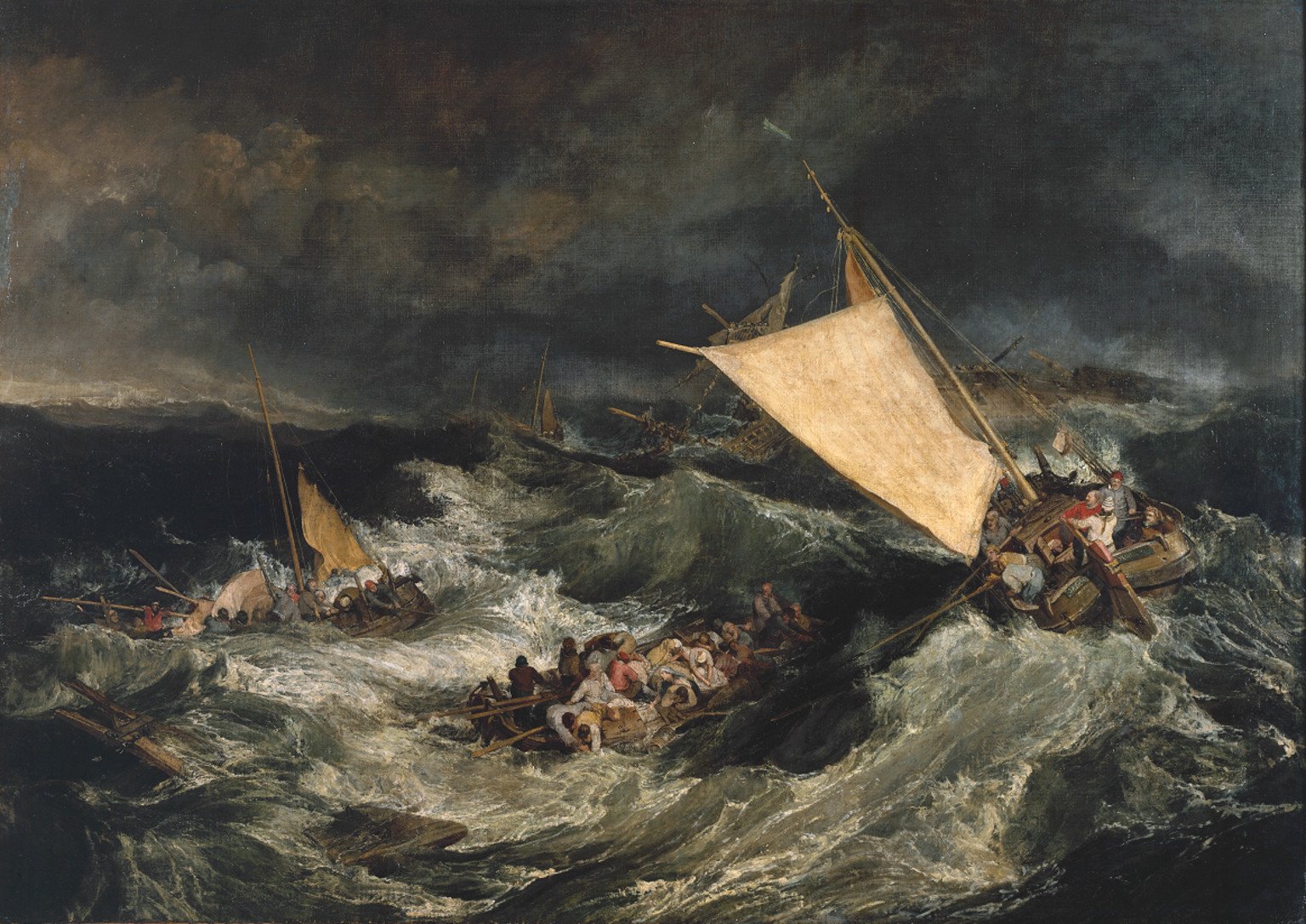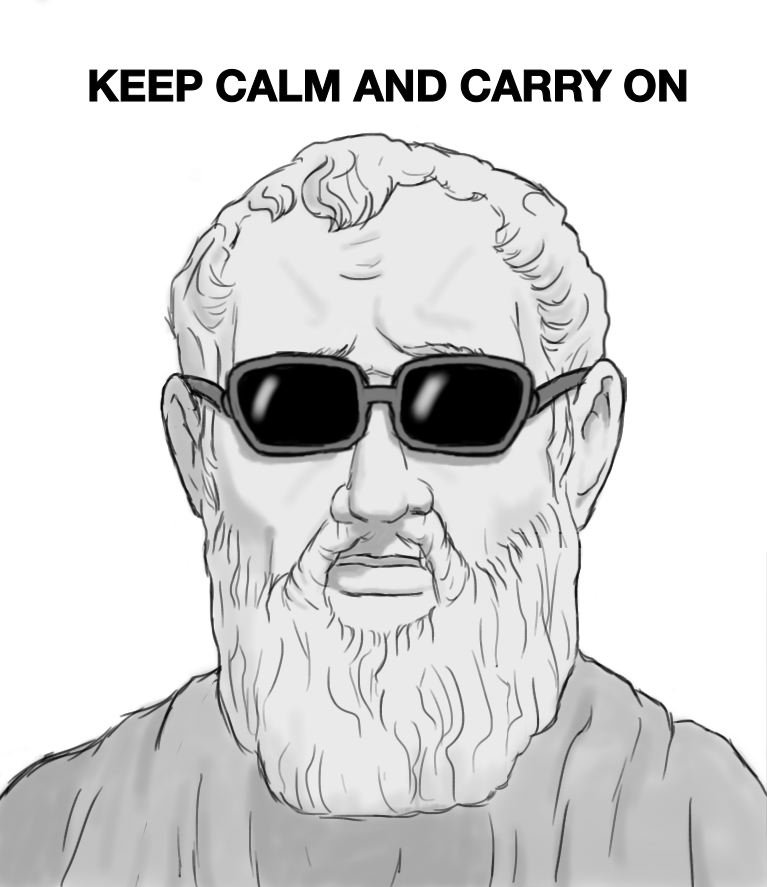I’ve been hanging around on Steemit for about a month now and have noticed that Stoicism is quite a popular philosophy in this crazy neck of the woods. Some people reference it literary in their post or comments, while others think and write things that closely resemble a Stoic outlook on life (whether they are aware of it or not).
To understand why this ancient philosophy is still popular today, I’ve decided to start a series of posts critically analysing Stoicism and its various revivals and influences throughout the ages. Welcome to Understanding Stoicism!
Before we dive into a critical analysis of the tenets of Stoic philosophy, we first need to learn something about its historical context. The first three parts of Understanding Stoicism will mostly act as an introductory history lesson. Later parts will feature extensive critical analysis of Stoic ethics, epistemology and cosmology.
Historical Context pt. 2: Zeno - Oracles, shipwrecks and lentil soup
 Joseph Mallord William Turner - The Shipwreck
Joseph Mallord William Turner - The Shipwreck© Tate Britain
In the previous episode of Understanding Stoicism we met Diogeneses, a madman who rejected all social conventions and believed that a virtuous life can only be attained by being in accord with nature. His controversial lifestyle had a profound impact on later philosophers, including the star of today: the founder of Stoicism, Zeno of Citium (334-262 BC). And although Zeno isn’t such a colorful figure as Diogeneses, his life story is pretty amazing too and crucial to understanding where his philosophy came from.
Zeno was a successful merchant that was driven into the arms of philosophy by two life-changing events. Early in his adult life he visited the oracle of the Greek god Apollo and asked the Pythia how he could live the best life possible. In her cryptical fashion she answered: “You should take on the complexion of the dead.” Zeno was taken aback and frantically started reading ancient texts, hoping to find meaning to the oracle’s words.
However, he didn’t find the true meaning of the prophecy in a book. In 311 BC he suffered a shipwreck and barely survived. Coming this close to ‘the complexion of the dead’ he decided that his days as a merchant were over and pledged to dedicate the rest of his life to philosophy. He would later say about this near death experience: “I made a prosperous voyage when I suffered shipwreck.”
So the reborn Zeno travelled to Athens. While reading in a bookstore he asked the bookseller where he could find a man as wise as Socrates. The man pointed at Crates of Thebes (an old pupil of Diogenes) who just happened to walk by. Zeno immediately decided to become his follower and learn all he could about Cynicism.
 Historically accurate depiction of Zeno of Citium (Source)
Historically accurate depiction of Zeno of Citium (Source)He was an excellent student of the philosophy, but Crates thought he was still too modest and lacked the necessary shamelessness. To cure him of his pride and to learn him how to reject social conventions, he gave Zeno the task to carry around a pot of lentil soup everywhere he went. Zeno was so embarrassed by this, that he tried to hide to pot under his robe. When Crates found out, he smashed the pot. The traumatised and in-lentils-covered Zeno decided after this that he had to get a new perspective on things. In a vengeful mood he started studying at Plato’s Academy, the sworn intellectual enemy of Cynicism.
This didn’t mean however that he disavowed what Crates and Cynicism had taught him. They showed him that the only thing you need to live a good life is virtue. And virtue is attained by being in accord with nature.
But Zeno wanted to dig deeper and find an explanation of why things are the way they are. Influenced by the teachings of the Academy he started searching for an explanation of the universe. He started forming metaphysical ideas to back up the Cynic claims.
It was the idea of the ‘Logos’ that tied it all together. According to Stoics everything in the universe or ‘Nature’ consisted of an active and a passive part. The passive part is matter, which is given form by the active part Logos, or ‘Universal Reason’, or ‘Fate’. Man has the ability to reason and thus align himself with the Logo. The more you live in accordance with your reason, the more you live in accordance with the Logos and Nature, and the more virtuous you become.
By designing a physical and cosmological model of a Nature that is governed by Logos, Zeno provided a theoretical foundation for the practical philosophy of Cynicism and thus founded Stoicism.
Later Stoic thinkers would greatly expand on this idea and come up with what we consider today to be the core tenets of Stoicism. Next time we’ll learn about how three Romans (a slave, a writer and an emperor) took Stoic thinking to its ultimate conclusion that one simply shouldn’t worry about his fate.
But in the meantime, think about this!
Do you believe in fate? Do you believe that everything that happens in the world is predetermined by an universal principle?
Sources and further reading:
Diogenes Laertius, Lives of Eminent Philosophers
Internet Encyclopedia of Philosophy, Stoicism
More Understanding Stoicism
Enjoyed this post? Feel free to upvote and follow @gamesjoyce !
Proud member of @steemdeepthink

Come join us on Discord! https://discord.gg/7qyarFD
You might also like:
You might not be such a good friend as you think you are - A simple philosophy of friendship
Is government a necessary evil? - Thomas Hobbes' Leviathan (Debate This! #1)
"The unexamined life is not worth living." - Hello Steemit!
